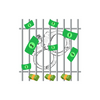
From Convict Leasing to For-Profit Prisons
, by Kane Kinnebrew, 3 min reading time

, by Kane Kinnebrew, 3 min reading time
The Unbroken Chain: From Convict Leasing to For-Profit Prisons
After the abolition of slavery, the South faced an economic crisis. The labor that had powered its economy was gone, and plantation owners and industrialists needed a new workforce. Enter the convict leasing system — a cruel workaround to the 13th Amendment, which outlawed slavery “except as a punishment for crime.” States began arresting newly freed Black men and women in large numbers for vague or fabricated offenses like “vagrancy,” “loitering,” or “talking too loud in front of a white woman.” These individuals were then leased out to private companies, railroads, and plantations for hard labor under brutal conditions.
Convict leasing became a massive revenue stream for Southern states and a deeply entrenched tool of racial control. Many historians consider it “slavery by another name,” and for good reason — the conditions were often worse than slavery itself because there was no financial incentive to keep leased prisoners alive. If one died, another could easily be supplied.
Fast forward to today, and the for-profit prison system — especially in the U.S. — reflects many of the same dynamics:
While the language and legal structures have changed, the core exploitative mechanism remains intact — using criminalization to extract labor and profit from historically marginalized communities, especially African Americans. And just like in the past, this system continues to strip individuals of their rights, deny opportunities for genuine rehabilitation, and reinforce cycles of poverty and systemic inequality.
Why It Matters
Understanding this continuity is crucial, not to dwell in despair, but to recognize that injustice often evolves rather than disappears. Juneteenth is a celebration of progress, but it must also be a call to vigilance and advocacy — because freedom delayed, rebranded, or sold for profit is not freedom at all.
Ending this modern-day injustice requires confronting uncomfortable truths about our systems of punishment, profit, and power — and pushing for reforms that prioritize rehabilitation, fairness, and dignity over exploitation.
Subscribe to our emails